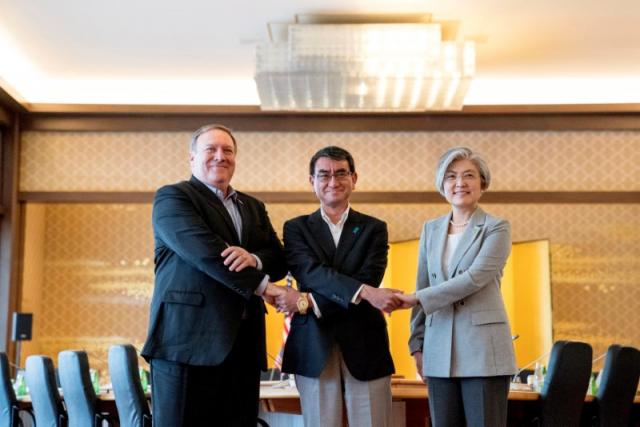TOKYO/WASHINGTON (Reuters) – U.S. Secretary of State Mike Pompeo brushed off North Korean charges that he used “gangster-like” diplomacy in negotiations in Pyongyang, saying on Sunday after meeting his Japanese and South Korean counterparts that he would keep pursuing denuclearization talks with North Korea.
Pompeo said in Tokyo there was still a lot of work to do, but he was confident North Korean leader Kim Jong Un would stick to a commitment to abandon nuclear weapons he made during a summit with U.S. President Donald Trump in Singapore last month.
“When we spoke to them about denuclearization, they did not push back,” Pompeo told a news conference after two days of talks in Pyongyang that ended on Saturday. “The road ahead will be difficult and challenging and we know that critics will try to minimize the work that we’ve achieved.”
Some U.S. senators expressed concern about North Korea’s harsh words and urged the Trump administration to keep up the pressure on Pyongyang. Republican Senator Joni Ernst, a member of the Armed Services Committee, said joint military exercises with South Korea suspended to show goodwill toward North Korea should be resumed “soon” if talks sputter.
Pompeo said that while he saw progress in Pyongyang, the United States was not relaxing the current sanctions regime or changing its “ironclad” commitment to defend allies South Korea and Japan.
Pompeo spoke after North Korea said the talks “brought us in a dangerous situation where we may be shaken in our unshakable will for denuclearization, rather than consolidating trust.”
The statement was carried by the official KCNA news agency on Saturday soon after Pompeo left Pyongyang, raising questions about the future of talks in which he is trying to persuade Pyongyang to give up a nuclear weapons program that threatens the United States.
“That was a fairly serious insult directed against Pompeo,” said Christopher Hill, who formerly served as U.S. ambassador to South Korea and lead negotiator with North Korea.
Kim made a broad commitment in Singapore to “work toward denuclearization” but did not give details on how or when he would dismantle North Korea’s nuclear program. Trump offered security guarantees to Pyongyang and pledged to suspend the large-scale military drills with South Korea.




